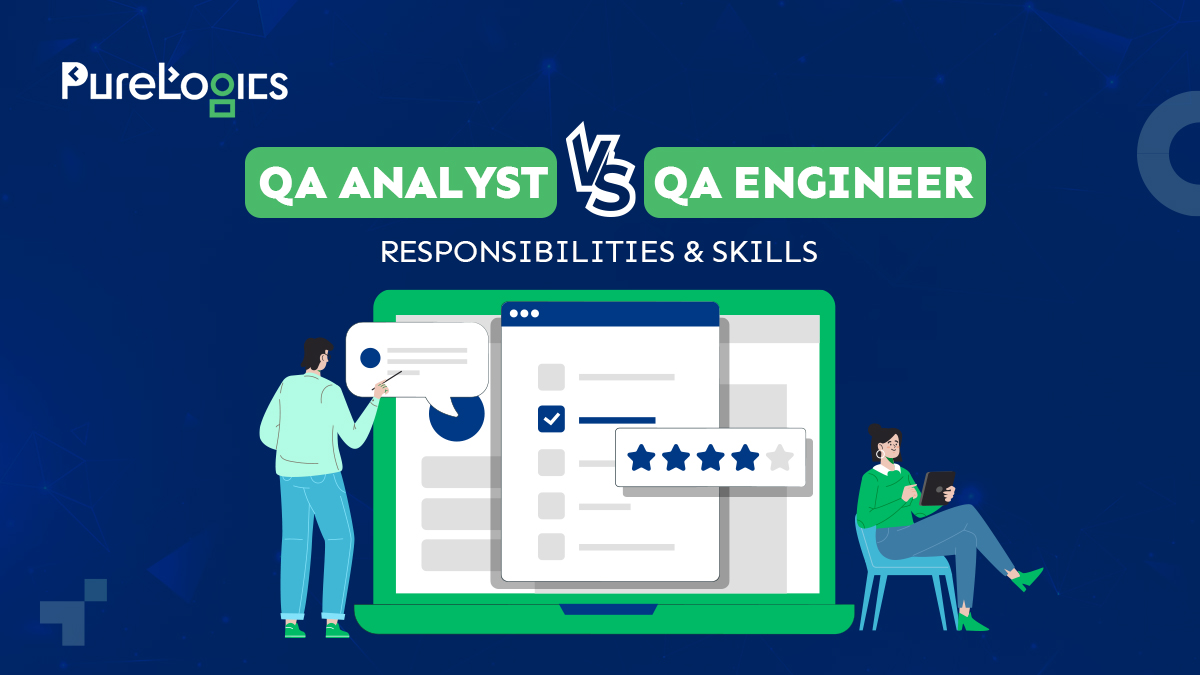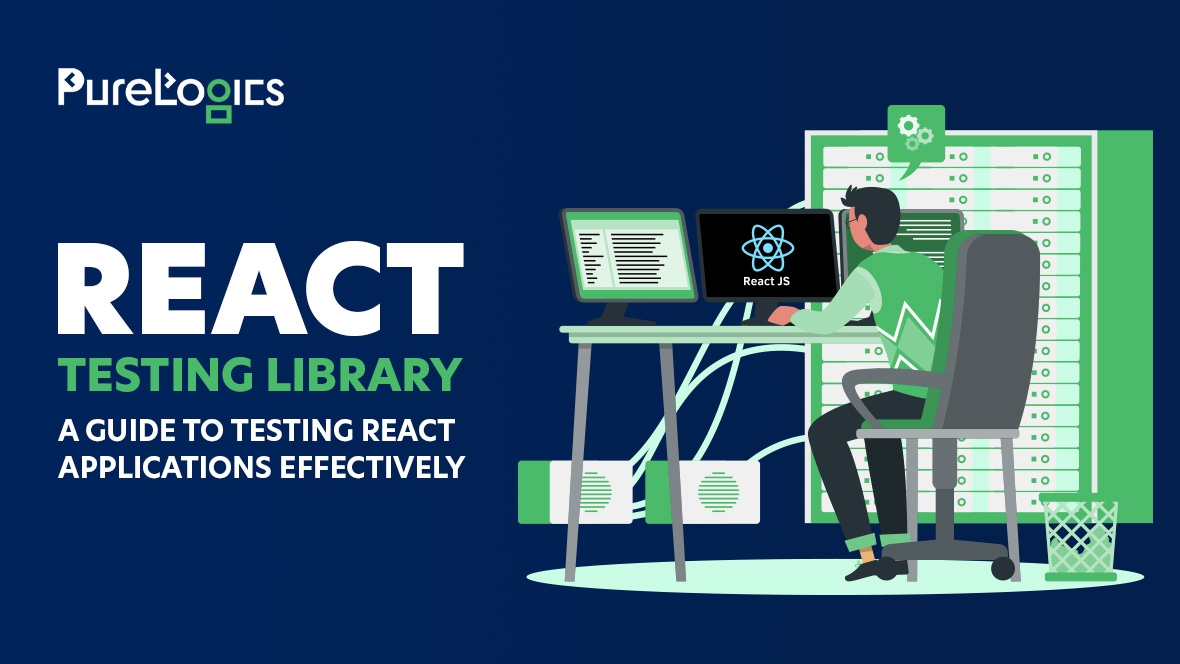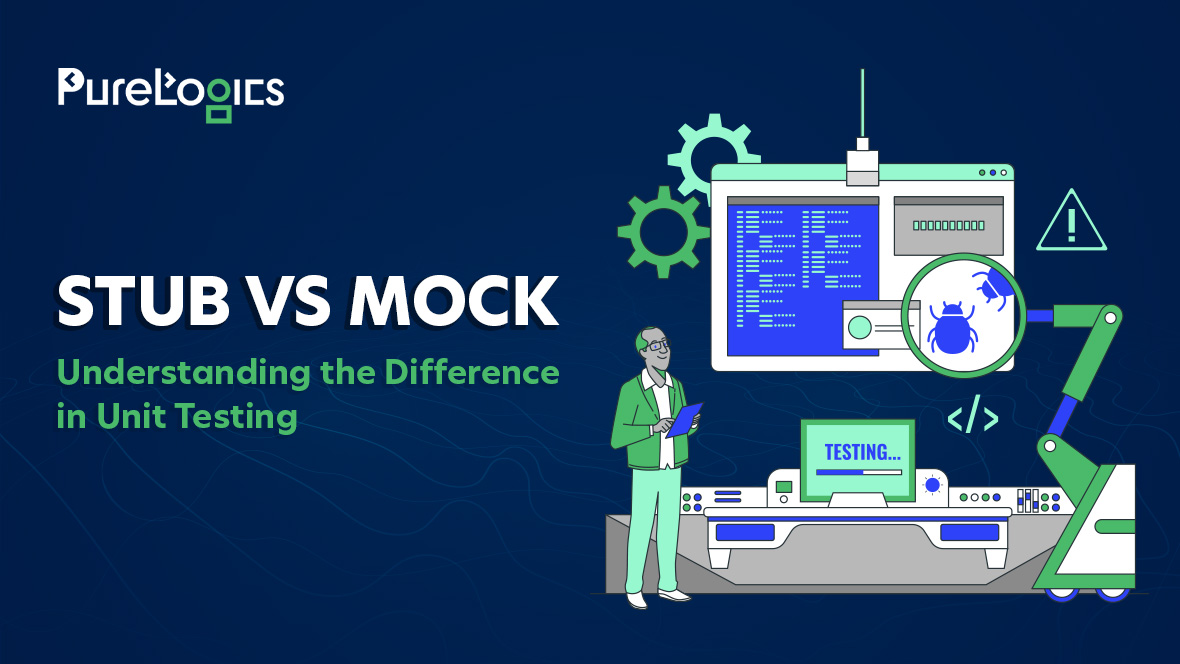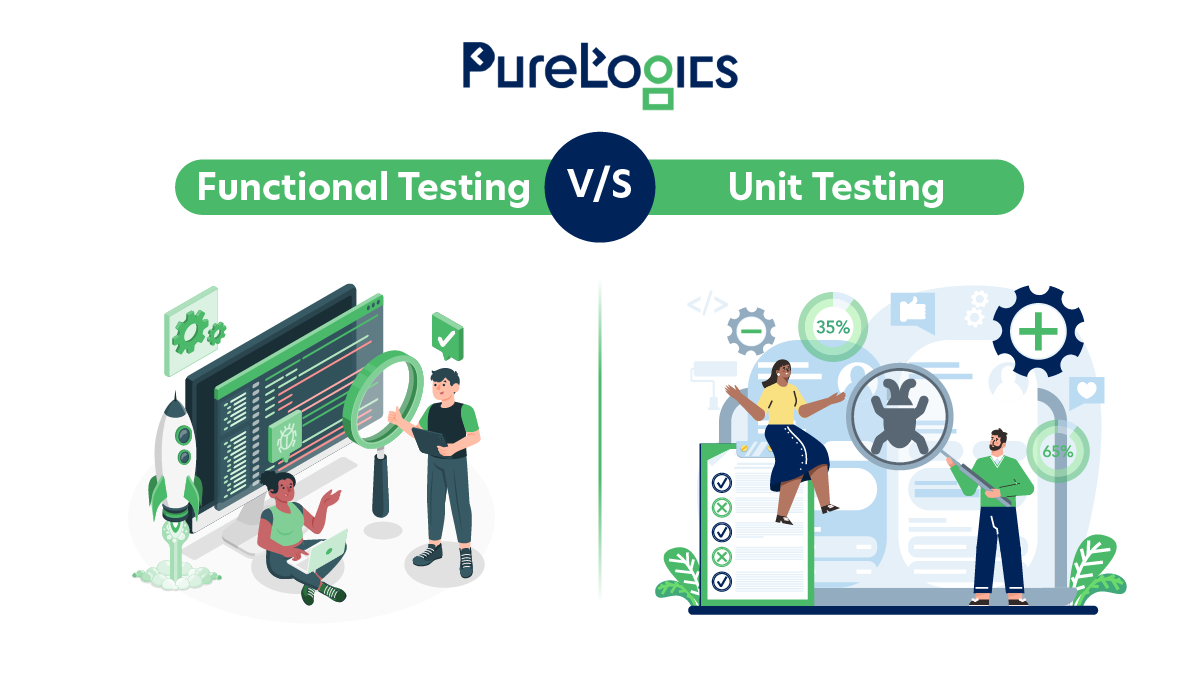Are you curious about jobs in quality assurance and want to know the difference between QA analysts and QA engineers? It is a common puzzle in the world of technology. Search engines are overloaded with the query of QA analyst vs QA engineer. Many people think that both jobs are mixed up, and that’s okay.
But opting for the right role matters a lot. Choosing the wrong one can generate many problems like slow work and not-so-great software applications.
In this blog post, we have discussed the differences between QA analysts and QA engineers in detail. Here, you will come to know the contrasting roles and responsibilities as well as the skills that set these professionals apart.
So, without any further ado, let’s start reading!
What is a QA Analyst?
A QA analyst is a professional who is responsible for testing and analyzing software, and ensuring that you get the best standards of functionality, security, and user satisfaction in your software applications. QA analysts make sure that a product meets the set industry standards in which you work.
They work closely with the software development team and other IT experts to formulate test plans and test cases. Their job is to implement the test plans and submit reports of errors or bugs they identify.
In addition to this, QA analysts also write and execute automated tests as they possess a strong grasp of processes and methodologies of software development.
What is a QA Engineer?
It is a QA engineer who is responsible for ensuring the highest quality of a software application before its launch. They monitor every step of the product development lifecycle and suggest corrections, ranging from fundamental product necessities to optimization processes.
Like QA analysts, they also work closely with software developers to generate test plans and test cases and ensure that your business fulfills customer expectations and satisfaction. Not only do they perform manual testing, but they also employ different automated testing tools to increase the speed of the testing process.
You have got a basic understanding of the roles of QA analysts and QA engineers. Now, let’s look at the differences in the roles and responsibilities of both professionals in detail.
Benefits of Working with a QA Analyst vs QA Engineer
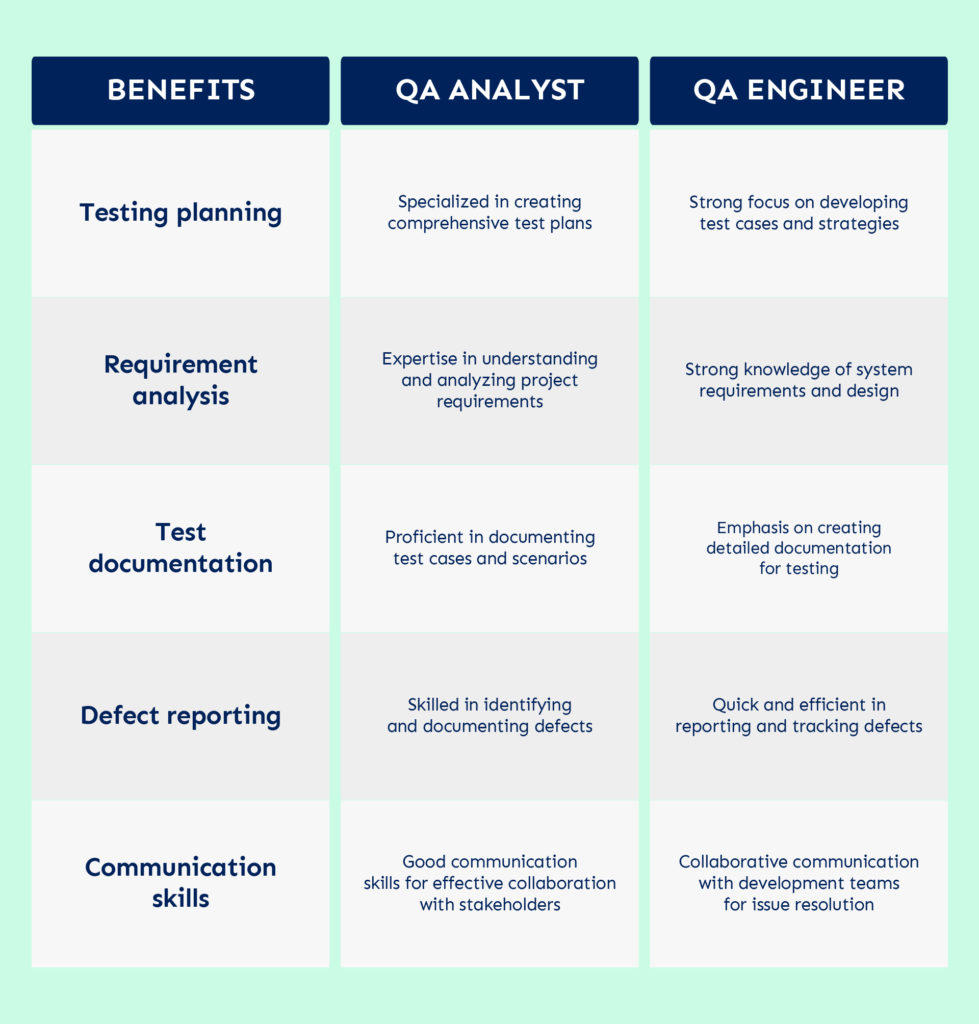
Responsibilities of QA Analyst
Following are some of the top responsibilities of QA analysts. Look at these!
Test Plan and Test Strategy
QA analysts create test plans that showcase the testing approach, scope, resources, as well as schedule. They also develop testing strategies and ensure thorough coverage of the software under multiple scenarios.
Test Case Design and Execution
QA analysts design all-inclusive test cases and execute them to identify defects. They perform manual testing as well as sometimes use automated testing tools. Their goal is to ensure the highest standards of quality in the software product.
Defect Reporting and Tracking
QA analysts identify and document defects they find in the software product. They track the status of defects throughout the product development lifecycle so that the product gets a timely resolution.
Collaboration with Developers
QA analysts work closely with software developers. They participate in discussions about requirements, design, and implementation. This is how software developers get valuable input from a QA perspective to resolve bugs on time.
Responsibilities of QA Engineer
Now let’s take a closer look at the top responsibilities of QA engineers!
Development of Test Automation
QA engineers create and maintain automated test scripts to improve the efficiency of software testing. Through the help of scripting languages and testing frameworks, they automate repetitive tasks and ensure faster and more frequent test execution.
Performance and Load Testing
QA engineers assess software’s performance and scalability under multiple scenarios. They are responsible for designing and implementing performance tests to identify errors in the product. Also, they optimize system resources and prepare the software application to handle the expected load.
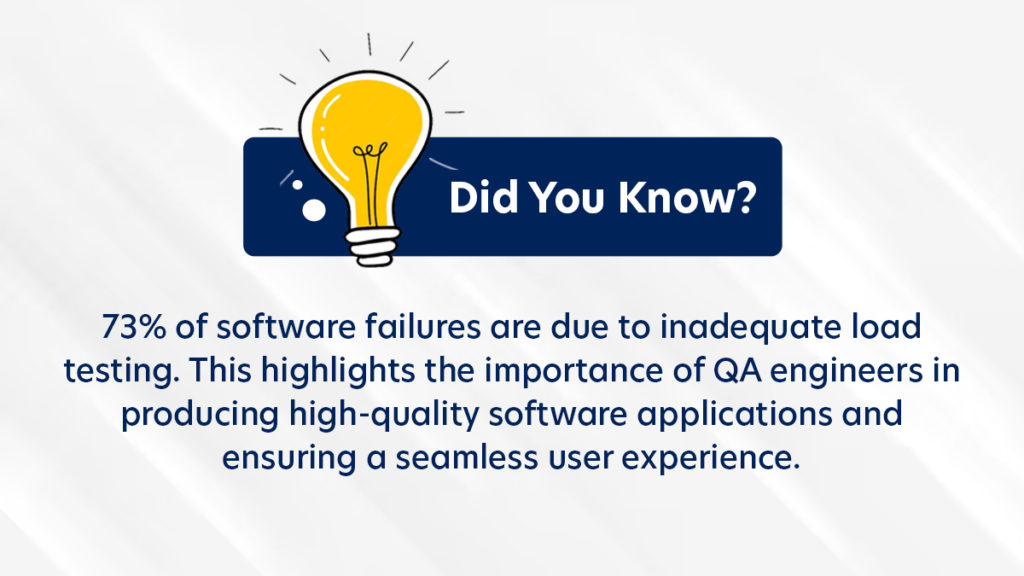
Continuous Integration/Continuous Deployment (CI/CD) Integration
QA engineers are also responsible for CI/CD integration. It helps them provide quick feedback to developers and maintain code quality throughout the development lifecycle.
Security Testing
QA engineers ensure that the software application has no security issues. They perform robust security testing to figure out all potential threats to the product.
QA Analyst vs QA Engineer: Required Skills
| QA Analyst | QA Engineer |
| Advanced manual testing techniques | Adept at automation testing frameworks (e.g., Selenium) |
| Strong knowledge of testing methodologies (e.g., Agile, Waterfall) | Strong programming skills (e.g., Java, Python, C#) |
| Advanced test case design and execution | Proficiency in scripting languages (e.g., JavaScript, Python) |
| Expertise in defect tracking and reporting | Continuous Integration and Continuous Deployment (CI/CD) |
| Specialized regression testing strategies | Understanding of system architecture and design patterns |
| Proficiency in exploratory testing | API testing and familiarity with tools (e.g., Postman) |
| Advanced requirement analysis techniques | Performance testing methodologies and tools (e.g., JMeter) |
| Effective communication skills for collaboration | Database knowledge and SQL skills |
QA Engineer vs QA Analyst: Salary Comparison
The salary of QA experts depends on multiple factors like location, experience, company size, and the industry where they work. The salary of a QA engineer is more than the pay of a QA analyst.
According to recent reports, in the United States of America, the average salary of a QA analyst is approximately $84,146/year and a QA engineer gets around $99,012/year.
The Bureau of Labor Statistics (BLS) claims that demand for QA engineers and safety testing jobs in health will increase by 6% between 2020 and 2030. It is because of the QA engineer’s contribution to the overall project.
Final Remarks
I hope this article has helped you understand the roles, responsibilities, and skills of QA analysts and QA engineers. As the technology industry evolves, the demand for both professions increases as well.
Without expert QA engineers and QA analysts, developing and launching high-quality software applications is impossible. So, always evaluate your interests, strengths, analytical mindset, and technical aptitude before choosing between both professions.
For more information or consultation, feel free to contact us.
PureLogics: We believe in logic, not magic!


 [tta_listen_btn]
[tta_listen_btn]
 December 18 2023
December 18 2023

